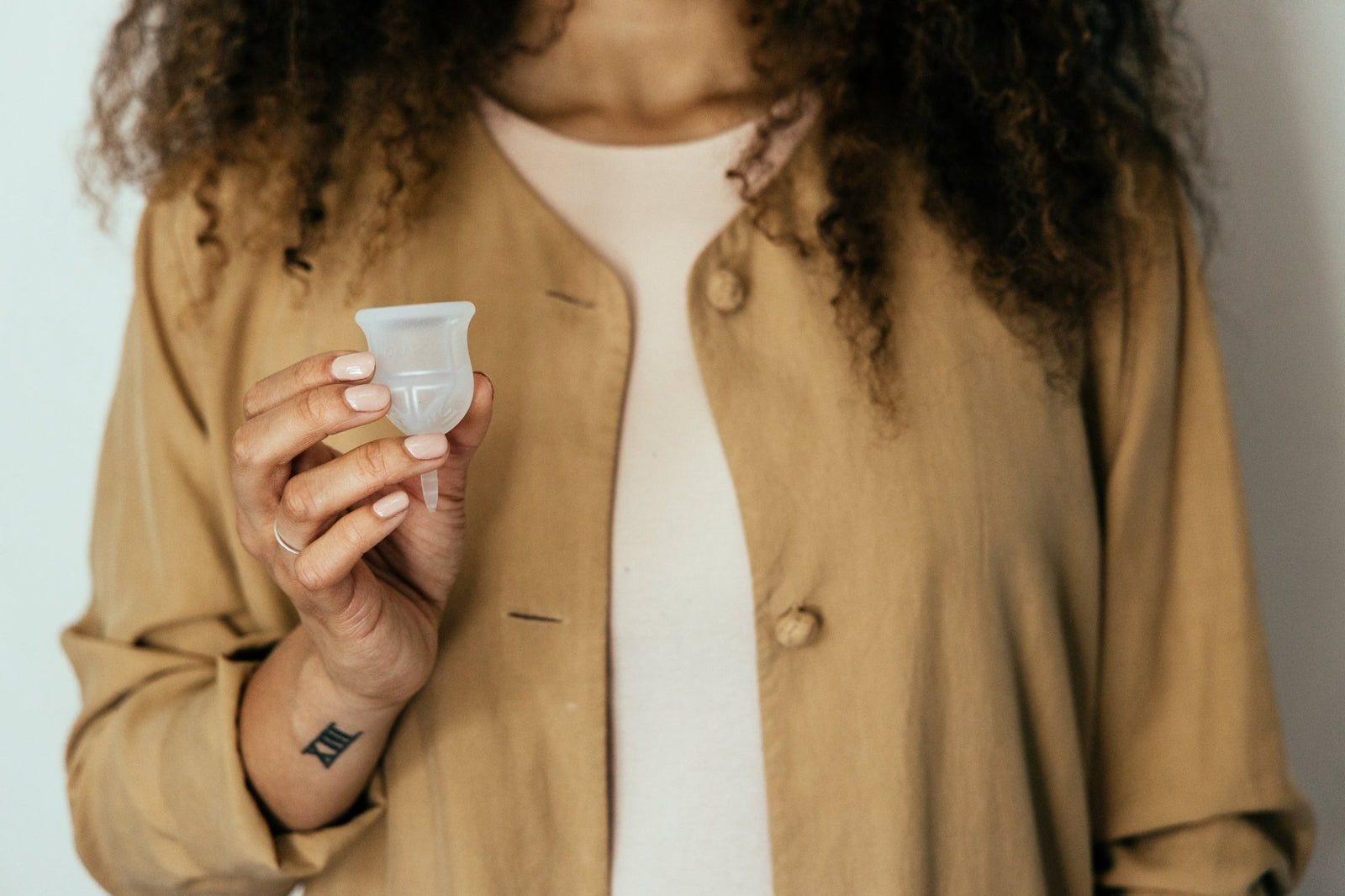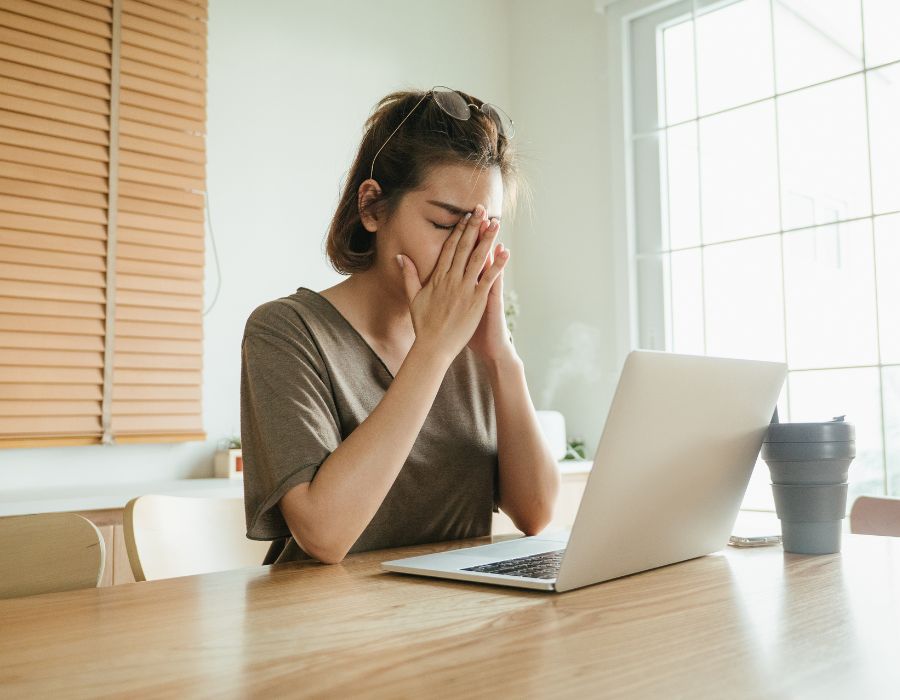
Periods are a normal part of health, and having healthy menstrual cycles is a sign that your body is working as it should, but sometimes comes with some less-than-desirable symptoms. You may also experience irregular cycles when the length of time between each period is more than 35 days or less than 24 days, when the amount of blood differs considerably, or when blood clots that appear are too thick. Irregular periods can have several root causes, some of which you can impact with lifestyle choices and self-care.
Next time your uterus decides to throw its monthly rage party, and you find yourself powering through mood swings, cramps, sore breasts, lower back pain, or nausea, try some of these tips to make for a more healthy (and comfortable) period:

Tip 1: Track Your Period with an App or Journal
Tracking your period can be helpful to note patterns or symptoms—such as headaches, period fatigue, energy boosts, or sex drive—that your body experiences at specific phases in your menstrual cycle. In addition, using a period tracking app can tell you when something may not be right with your menstrual health and notify you of when to see a doctor. If you’re considering alternative healthcare methods, by tracking your fertility and reproductive health on your own, you’ll be able to determine when you’re the most fertile, so you can either avoid pregnancy or try to get pregnant. A period tracking app is essentially a menstrual cycle calendar or period calculator to knowhow many days between periods, when you’ve missed a period, and to help you track ovulation. Not sure where to start? We rounded up the best period tracking apps for you.
Tip 2: Eat for Your Menstrual Cycle
Some studies have shown that obesity, being underweight, or having an eating disorder can interfere with the production of hormones needed forregular periods and ovulation and negatively affect the amount of adipose tissue you have. Adipose tissue is a source of estrogen, and having too much or too little of it will result in an abnormal amount of the hormone, disrupting the normal menstrual cycle.

Rapid weight gain may also be a sign that your hormones aren’t in balance and is a common symptom of PCOS and hypothyroidism. Consult with your doctor if you think you’re experiencing these symptoms.
To maintain a healthy hormone balance, avoid skipping meals, binging junk food, and overeating. Make sure you eat enough carbohydrates, fiber, healthy fats, and folate. Folate is especially important since it promotes regular ovulation. This vitamin can be found in eggs, legumes, and leafy greens.
Tip 3: Manage and Reduce Stress
The hypothalamus is the part of the brain that plays a vital role in regulating periods. It releases chemicals that signal the pituitary gland to stimulate the ovary to release estrogen and progesterone. However, stress causes a rise in cortisol, the stress hormone, which then interferes with the communication between your hypothalamus, pituitary gland, and ovary. This means that too much stress can have a pretty negative impact on your periods, and finding ways to manage your stress during and outside of your period can be helpful.

Take a few minutes every day to relax. Giving some new yoga poses a try or taking a simple walk outdoors to get fresh air and sunshine can ease your mind and help your body recalibrate. There are also meditation apps, like Calm and Headspace, you can use to help relieve stress.
Tip 4: Switch to Non-toxic Period Care, like a Reusable Silicone Menstrual Cup
Common disposable period products, like tampons and pads, are often bleached and contain toxins that may be harmful to you. Some even include harsh chemicals like formaldehyde, dioxin, and pesticides. Since the vagina is one of the most absorbent parts of the body, you need to pay attention to what it comes in contact with.

Use a reusable silicone menstrual cup, like VOXAPOD® menstrual cup to ensure that there are no adverse reactions. VOXAPOD cups are made using 100% FDA-approved, medical-grade silicone that's tested for biocompatibility and proven safe and effective. Menstrual cups collect rather than absorb your period flow, eliminating unnatural odors and dryness often caused by absorbent period products (i.e. pads and tampons). More importantly, it’s naturally hygienic so it won’t disrupt your natural pH balance which is essential in protecting you against bacteria and infections. Plus, VOXAPOD menstrual cups are reusable and washable, saving you money every month and keeping you and the planet more healthy.
Tip 5: Use Heat to Soothe Cramps
Heating pads or hot water bottles can really help soothe cramps and take your mind off the pain. If you love steeping in a hot bath, try adding Epsom salt, which contains magnesium that can help relax your muscles and reduce cramping.
Remember, it’s okay to slow down and do nothing sometimes––give yourself permission to curl up with a cup of herbal tea and a heating pad for a night (or day) of Netflix and chill.
Tip 6: Add Period-calming Supplements Into Your Routine
Magnesium can be one of the biggest champions for combating period symptoms––it helps with painful cramps, reduces stress, fights insulin resistance if you have PCOS, and eases perimenopausal symptoms. You can get magnesium from food (green leafy veggies, dark chocolate, or nuts) but may need to use a supplement because magnesium can be depleted from stress. Try adding magnesium glycinate or bisglycinate, which is the most absorbable and least likely to cause diarrhea.

Ginger is a powerful anti-inflammatory and can help reduce nausea, fight headaches, decrease bloating or relieve any wonky digestive moves your body decides to pull. Ginger––maybe most importantly––can help relieve dysmenorrhea (painful period cramps). If you don’t have the pill supplement on hand, you can always add some fresh ginger to a dish or blitz it in your smoothie packed with healthy fats and dark leafy greens (also known to help with cramps and period symptoms).
It stinks to feel like your emotions are hijacked every month with hormone mood swings. St. John’s Wort is a great supp for alleviating mild symptoms of depression or anxiety––or just to give you a natural mood boost and make you more alert throughout your day. It’s plant medicine, but still packs a punch, so if you’re already taking something for anxiety or depression, you should check with your doctor before adding any herbal remedies.
Tip 7: When to See a Doctor or Consult a Health Professional
If you’ve had an irregular cycle for months or are feeling intense pain, heavy bleeding, fatigue, or other abnormal symptoms during your period, it’s best to consult a health professional. An irregular cycle or symptoms can point to a more serious problem, such as PCOS, anemia, endometriosis, or uterine fibroids.

You may need to see a doctor if:
- You experience severe pain with your periods
- Your periods are closer than 24 days apart consistently
- You have periods longer than seven days on a regular basis
- You’re skipping months between periods and not on hormonal medication
- You have significant bleeding or spotting between period and you’re not on hormonal medication
- You have very heavy bleeding (soaking through a pad or tampon every hour or having to change your menstrual cup more frequently)
If you feel like your doctor isn’t listening to your symptoms or willing to do necessary tests to find the root cause, get a second opinion. You are your own biggest advocate for your health and it’s okay to demand the services that you need.
You may also consider consulting with a naturopath or nurse practitioner for non-emergency procedures, irregular periods, or providing sound advice for pain and stress relief in relation to periods, or consult with a nutrition expert for advice on diet in relation to healthy periods. These professionals, while not primary care physicians, can often provide insight and crucial advice as to whether you’ll simply need a change in lifestyle, or if you should get tested for something more serious.
Have another great tip for having a healthy period? Drop it in the comments to add to our list!
Know your body more––sign up to get our emails for more great tips on healthy periods and whole body wellness.

Written by Jeline Boslow, a feminist and mental health advocate. She is passionate about bringing important topics to a wider audience. When she’s not working on a new editorial piece, she’s often tending to her indoor garden.




Hacking Intelligence
December 21, 2025
RECOVER YOUR LOST CRYPTO ASSETS & IMPROVE YOUR CREDIT SCORE WITH ASORE HACK INTELLIGENCE. NO UPFRONT PAYMENT REQUIRED.
Asore Corp. is a team of Cyber Intelligence, Crypto Investigation, Asset Tracing and ethical hacking experts. Working together to form a private cyber and crypto intelligence group focused on providing results.
Using the latest Cyber Tools, Open Source Intelligence (OSINT), Human Intelligence (HUMINT), and cutting edge technology, we provide actionable intelligence to our clients.
WHY CHOOSE US?
– Expert Cyber Investigation Services —Our cyber investigators operate professionally and anonymously to crack all firewalls known to man.
– Cryptocurrency And Digital Asset Tracking — We are able to track the movement of different crypto currencies and assets. If the asset has been moved, we are able to follow it.
– Strategic Intelligence For Asset Recovery — The first step to recovery is locating recoverable assets. Our experienced team will be able to walk you through the process.
Schedule a mail session with our team of professionals today via – asorehackcorp (@) gmail (.) com to get started immediately.
BEWARE of FABRICATED reviews and testimonies endorsing tricksters, do not get scammed twice.
Disclaimer: Asore Corp. is not a law enforcement agency and not a law firm. Like all legitimate private investigators, we can guarantee specific results. We apply our expertise and resources to every case professionally and ethically.88